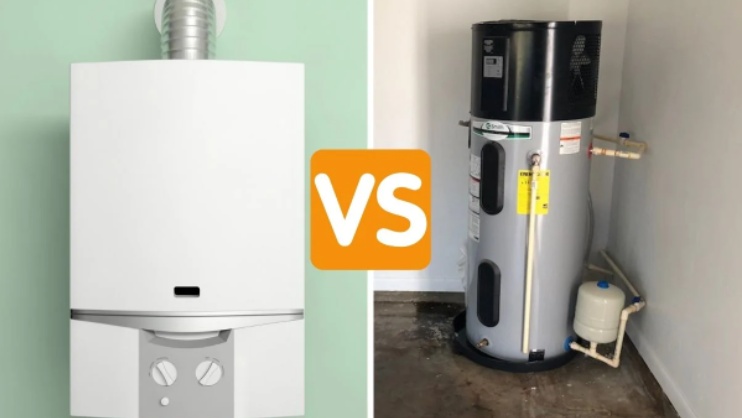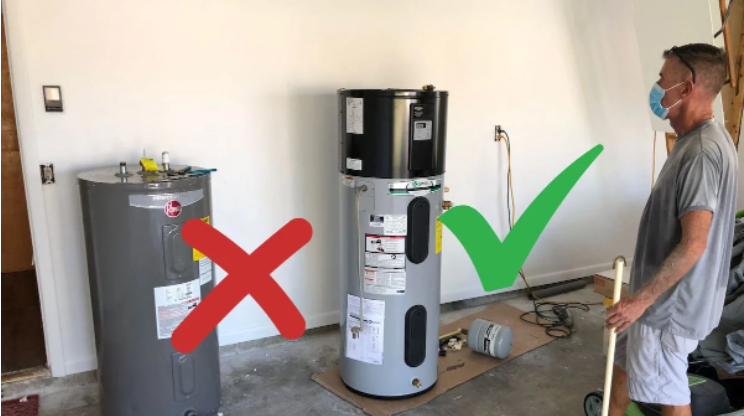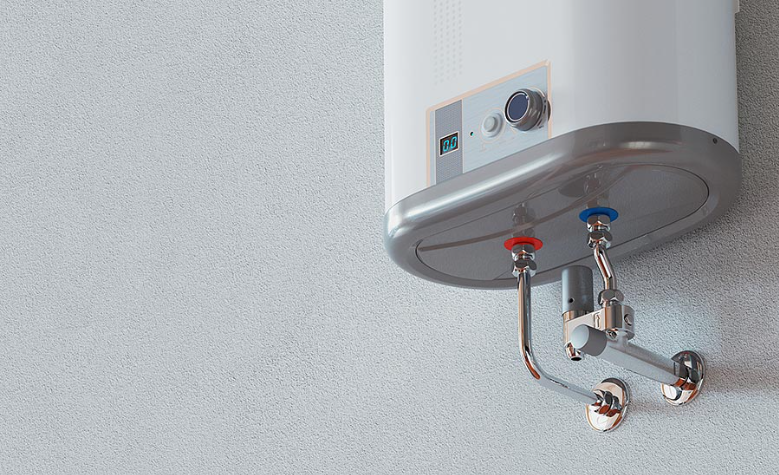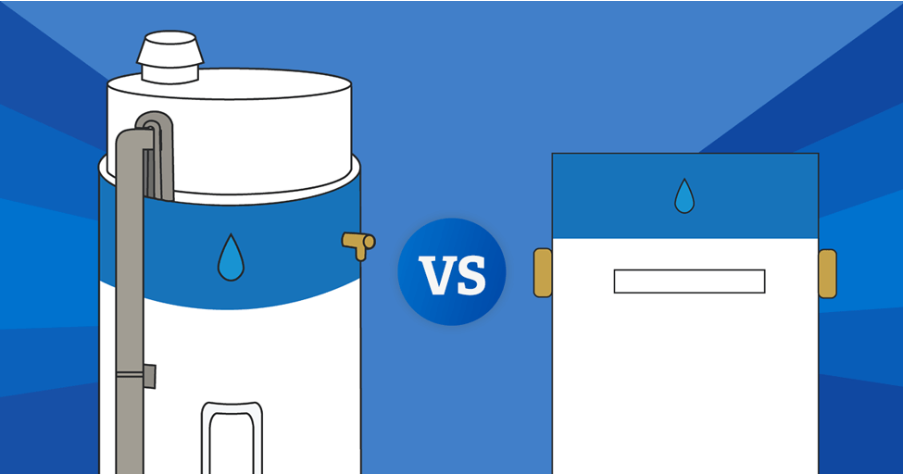You’re not alone debating whether to buy a tankless water heater or a hybrid one. One of the most frequently asked questions among our readers and subscribers is: which one should I buy? What’s the difference between a hybrid water heater vs tankless one? There are many factors to consider when purchasing an energy-efficient water heater, including your budget, the size of your home, and how much hot water you require to feel comfortable in your home. This article will consider all of these factors, including tankless and hybrid water heaters pros and cons, to assist you in selecting the best water heater for your needs.
If you’re looking for a new water heater, you’ve probably come across two main choices: hybrid water heater vs tankless water heater. How do you choose between them? We’ll compare the tankless and hybrid water heaters pros and cons below to help you make an informed decision. Let’s get started! Let’s dive in!
Hybrid Water Heaters: What Is It?

A hybrid water heater, also known as a heat pump water heater, combines all of the benefits of a traditional water heater with the energy-saving benefits of a heat pump. A hybrid water heater might be right for you if you live in a warm climate and your home’s appliances are all electric (not gas).
How Does A Hybrid Water Heater Work?
Heat is drawn into the evaporator coil of a hybrid water heater, also known as a heat pump water heater. The refrigerant in the evaporator coil allows it to absorb heat from the air. Finally, before water passes from the heater tank into your home’s showers, faucets, and large appliances, a heat exchanger heats water within the tank to the desired temperature.
Consider this process similar to that of your refrigerator but in reverse. A heat pump water heater pulls hot air into the water instead of releasing it to cool the contents of a refrigerator or freezer. Like a tankless water heater, a heat pump water heater does not run continuously, making it more efficient than a traditional water heater. The tank will fill during periods of increased use, preventing households with multiple people from running out of water at critical times.
Hybrid Water Heaters: Pros and Cons

So, what are the hybrid water heaters pros and cons? Are you trying to decide between a tankless or hybrid water heater? We discussed the hybrid water heaters pros and cons below to help you decide which is best for you.
Pros:
- They use over 50% less energy and are less expensive to run than standard electric water heaters.
- They cool and dehumidify the surrounding area.
- Families with multiple children can make use of them.
- They have a longer lifespan than storage tank units. (Water heaters in storage tanks typically last 8 to 12 years, while heat pump water heaters last 13 to 15 years.)
Cons:
- The unit’s heat pump location may not work in some spaces with lower ceilings.
- They will not function properly in temperatures below 40 degrees Fahrenheit.
- Someone must install it with over 1,000 cubic feet of surrounding air to draw heat from. Installing them in a space less than 12 feet by 12 feet reduces their efficiency.
- They aren’t as long-lasting as tankless units. Water heaters without tanks can last up to 20 years.
Tankless Water Heaters: What Is It?

A tankless water heater takes up much less space than a storage water heater because it heats water directly. When you turn on the hot water, cold water flows through a pipe into the tankless water heater unit, heated by a gas burner or an electric element. It ensures a steady supply of hot water.
Tankless water heaters can produce 2 to 5 gallons of hot water per minute. According to energy.gov, gas-fired tankless water heaters have higher flow rates than electric models.
Installing multiple tankless water heaters is common for those with large families who use a lot of hot water. It will ensure enough hot water for showers, laundry, and the dishwasher.
How Does a Tankless Water Heater Operate works?
Without using a storage tank, tankless water heaters heat water instantly. When you turn on a hot water faucet, cold water flows through a heat exchanger in the unit, where it is heated by a natural gas burner or an electric element. Tankless water heaters provide a constant supply of hot water as a result. You don’t have to wait for a hot water tank to fill up. Tankless water heaters restrict flow rates.
Tankless water heaters typically provide 2–5 gallons (7.6–15.2 liters) of hot water per minute. Flow rates are higher with gas-fired tankless water heaters than with electric ones. However, even the largest gas-fired model cannot always provide enough hot water for multiple simultaneous uses in large households.
Taking a shower and running the dishwasher simultaneously, for example, can tax a tankless water heater. You can solve this issue by installing two or more tankless water heaters. You can also install separate tankless water heaters for hot water appliances in your home, such as a clothes washer or a dishwasher. Water heaters may be too costly and not worth the cost.
Tankless Water Heaters: Pros and Cons
Pros:
- They use less energy than storage tank water heaters.
- They take up a lot less room than a storage tank unit. Tankless units are typically 2 feet tall and a little over 1 foot wide.
- Storage tanks and heat pump water heaters have a shorter lifespan. (Water heaters in storage tanks typically last 8 to 12 years.) Heat pump water heaters have a life expectancy of 13 to 15 years. Water heaters without tanks can last up to 20 years.
Cons:
- They are more expensive to buy (and install) than storage tank water heaters.
- A single unit may not provide enough hot water for large households simultaneously using water for multiple purposes.
Hybrid Water Heater Vs Tankless – Comparison
1 – Hybrid Water Heater Vs Tankless Installation Cost
Hybrid and tankless water heater installation costs vary depending on the facilities you already have. Tankless water heaters sometimes require a larger gas line to be run to the unit to meet peak demand for hot water. It must install a hybrid water heater in an open area, which may cause running electrical to another part of your home.
Aside from these potential installation costs, there’s also the cost of the water heater itself and its basic setup. The average price of these water heaters is similar. Your tankless water heaters will set you back $1600 on average, while hybrids will set you at $1660.
2 – Performance of Water Heaters
Performance is the most important factor to consider with water heaters. You want to know that your water heater can keep up with your household’s needs. Tankless and hybrid water heaters can provide better performance than traditional storage-tank water heaters. They’re also both capable of meeting the needs of a typical four-person household.
The two types of water heaters operate differently, which can affect performance. On-demand tankless water heaters heat water only when needed, which means they may not be capable of heating water for multiple purposes simultaneously. You should be able to do two things with hot water at once, but a third would push the tankless water heater’s limits.
Hybrid water heaters have their issues with performance. You don’t have to worry about running out of hot water with normal use because they have a tank. The water may not heat as quickly as other water heaters. Because heat heats the water from the surrounding environment, it may not get as hot if that environment does not have enough heat to pull through the system to heat the water.
3 – Tankless and Hybrid Heater Operating Costs
The cost of running a hybrid water heater vs tankless water heater varies depending on the fuel used. If you only have electric service, you’ll have to choose between a tankless or hybrid water heater. The hybrid will have lower operating costs because it does not generate heat.
However, if you have gas service and can use a gas water heater, the tankless water heater will be less expensive to run daily. It is because natural gas is typically less expensive than electricity. In addition, tankless water heaters use less energy than storage tank water heaters.
The operating costs of the two types of water heaters are nearly identical. A hybrid water heater’s average annual operating costs are around $190. The annual operating costs of a gas-fueled tankless water heater are around $228. Naturally, your costs will be higher if you have a large family.
4 – Energy Efficiency of Water Heaters
Hybrids and tankless water heaters are significantly more energy-efficient than traditional storage-tank water heaters. Instead of maintaining constant heat in a tank, a tankless water heater saves energy by only heating water as needed. Hybrids save energy by extracting heat from the air and pumping it into the water, so they never generate their heat. The water heater that does not produce heat will be the most energy-efficient. However, this does not always equate to lower operating costs.
What Type Of Water Heater Should You Get?
For space, tankless beats out the hybrid option. Hybrid units can pull heat from the air and heat water with very little energy in warmer climates. Both systems’ energy savings outperform and outlast traditional water heaters. The hybrid water heater competes with tankless water heaters for the top spot among homeowners and plumbers because of similar energy efficiency and benefits. Consult a professional plumber to determine the best type of water heater for your home and family.
Conclusion
If you’re looking for a new water heater, you’ve probably heard of hybrid water heater vs tankless water heaters. While they may sound dissimilar, both are alternatives to the traditional storage water heater. What is your best option? Both have pros and cons, but this article will help you understand the differences between hybrid water heater vs tankless water heaters to choose which one best suits your needs!
Frequently Asked Question
A: A hybrid water heater has a 15-year lifespan, so with proper maintenance, you’ll get your money back, including Blue Planet’s installation and water heater costs.
Even though a tankless system cannot run out of hot water, demand can overwhelm it. A single tap will not suffice: you can keep running that single shower until you run out of hot water.
So, besides saving money on your energy bill, you’ll be able to keep your garage cool on hot summer days! Hybrid water heaters are 3.5 times more efficient than standard electric water heaters, producing 15% more hot water in the first hour.
Before it needs to be replaced, a tankless water heater can last up to 20 years. Regardless of the type of water heater installed, it will rust over time, and it’s critical to monitor it for any of the issues, especially if it’s nearing the end of its lifespan.
